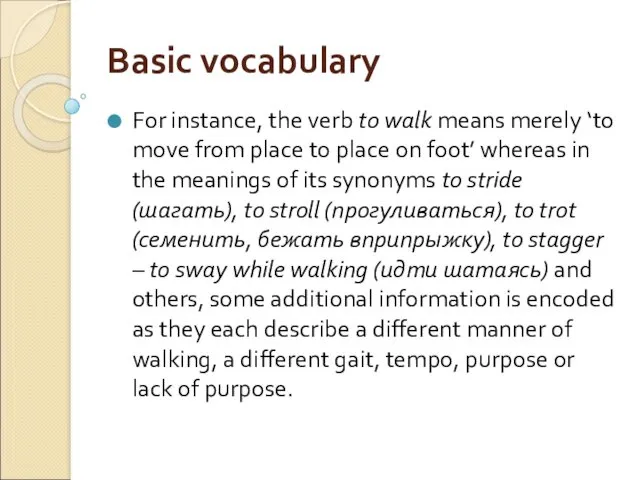Содержание
- 2. The questions under consideration A word as a fundamental unit of language. Motivation of words. Functional
- 3. TEST 2 1. Give definitions to the following: lexical system, syntagmatic relations, paradigmatic relations, a word,
- 4. Complete the following sentences using words and expressions given in the list below: A. The smallest
- 5. 2.Complete the following sentences using words and expressions given in the list below: E. When there
- 6. 3. Answer these questions What determines the choice of stylistically marked words in each particular situation?
- 7. 3. Answer these questions Are learned words used only in books? Which type of learned words,
- 8. 1.A word as a fundamental unit of language. The term system (definition)
- 9. The term system denotes a set of elements associated and functioning together according to certain laws.
- 10. The lexical system of every epoch contains productive elements typical of this particular period others that
- 11. The elements of lexical system are characterized by their combinatorial and contrastive properties determining their syntagmatic
- 12. EXAMPLE compare the meaning of the verb "to get" in the sentences He got a letter.
- 13. On the syntagmatic level, the semantic structure of the word is analysed in its linear relationships
- 14. Paradigmatic contrastive relations Where do they exist ? Example: to go a mile to run a
- 15. Paradigmatic contrastive relations exist between words belonging to one subgroup of vocabulary items (e.g., verbs of
- 16. On the paradigmatic level the word is studied in its relationships with other words in the
- 17. work n – labour n. Work работа, труд; 1 the job that a person does especially
- 18. On the paradigmatic level words of similar meaning e.g. to refuse v – to reject v
- 19. On the paradigmatic level of different stylistic characteristics (e.g. man n – chap n – bloke
- 20. The main problems of paradigmatic studies are synonymy, antonymy, functional styles.
- 21. Words vs Morphemes the central elements of language system the biggest units of morphology the smallest
- 22. Why is the definition of a word the most difficult? The simplest word has many different
- 23. Why is the definition of a word the most difficult? the word is a sort of
- 24. The definition of a word The word has been defined semantically, syntactically, phonologically and by combining
- 25. The definition of a word Many eminent scholars such as V.V. Vinogradov, A.I. Smirnitsky, O.S. Akhmanova,
- 26. The definition of a word A word is the smallest unit of a given language capable
- 27. The definition of a word "a word is defined by the association of a particular meaning
- 28. 2. Motivation of words. The term mоtivation is used to denote the relationship existing between the
- 29. Three types of motivation phonetical motivation, morphological motivation semantic motivation
- 30. What motivation is it? e.g., bump, buzz, chatter, clatter, giggle, hiss, whistle, etc.
- 31. The phonetical motivation is when there is a certain similarity between the sound that make up
- 32. morphological motivation The main criterion in morphological motivation is the relationship between, morphemes. e.g., "endless” is
- 33. morphological motivation "cranberry" is only partially motivated because of; the absence of the lexical meaning in
- 34. Semantiс motivation is based on the co-existence of direct and figurative meaning of the same word
- 35. Semantiс motivation Semantic motivation is clear in popular names of flowers, plants and birds violet, bluebell,
- 36. Semantiс motivation As to compounds their motivation is morphological if the meaning of the whole is
- 37. fоlk etуmоlogy (popular etymology, false etymology) E.g. "mushroom” from French "moucheron" has nothing in common with
- 38. 3. Functional style (definition) ”a system of expressive means peculiar to a specific sphere of communication”.
- 39. Functional style (definition) A system of expressive means peculiar to a specific sphere of communication. By
- 40. Subdivisions of spheres of communications formal (a lecture, a speech in court, an official letter, professional
- 41. 4. Informal style (where?) Informal vocabulary is used in one’s immediate circle: family, relatives, or friends.
- 42. Informal style (characteristics) relaxed, free-and-easy familiar
- 43. the informal talk differs well-educated people adults (the choice of words) people living in cities the
- 44. The choice of words is determined not only by informal and formal situations but by speaker’s
- 45. three types of informal words colloquial slang dialect words and word-groups
- 46. 5. Colloquial words (Where? By whom?) in everyday conversational speech both by cultivated and uneducated people
- 47. literary colloquial words appear in dialogues in which they realistically reflect the speech of modern people
- 48. examples of literary colloquial words Pal (кореш, друг) and chum (приятель, дружок) are colloquial equivalents of
- 49. examples of literary colloquial words A considerable number of shortenings are found among words of this
- 50. literary colloquial words (are to be distinguished from) familiar colloquial words (by the young and the
- 51. 6.Slang The Oxford English Dictionary defines slang as “language of a highly colloquial style, considered as
- 52. Slang All or most slang words are current words whose meanings have been metaphorically shifted. Each
- 53. Slang (the main reasons to use?) To be picturesque, To be arresting, To be striking To
- 54. Slang (who are users?) The circle of users of slang is more narrow than that of
- 55. 7.Dialect words dialects are regional forms of English Dialect is a variety of a language which
- 56. Dialect words are constantly being incorporated into everyday colloquial speech or slang into the common stock
- 57. Dialect words (examples) tha (thee) – the objective case of thou; brass – money; nivver –
- 58. 8. Learned words (two main groups): words associated with professional communication associated with the printed page.
- 59. Learned words (further subdivision) We find here numerous words that are used in scientific prose and
- 60. Learned words ‘officialese’ (канцеляризмы). These are the words of the official, bureaucratic language. They should be
- 61. Learned words (further subdivision) the words found in descriptive passages of fiction. These words, which may
- 62. Learned words Here are some examples: solitude=loneless, lonely place (уединение, одиночество), sentiment=feeling (чувство), fascination=strong attraction (очарование,
- 63. Learned words (further subdivision) There is one further subdivision of learned words: modes of poetic diction.,
- 64. Examples of poetic words “Alas! (увы) they had been friends in youth; But wispering tongues can
- 65. Learned words (not only in printed page) Though learned words are mainly associated with the printed
- 66. Learned words But on the other hand, utterances overloaded with such words are absurd and ridiculous.
- 67. Learned words and Writers Writers use this phenomenon for stylistic purposes. When a character in a
- 68. Learned words However any suggestion that learned words are suitable only for comic purposes, would be
- 69. Learned words It is also true that some of these words should be carefully selected and
- 70. 9.Archaic and obsolete words Archaic – are old and no longer used words; obsolete – no
- 71. Archaic words are restricted to the printed page. These words are already partly or fully out
- 72. Archaic words Numerous archaisms can be found in Shakespeare, but it should be taken in consideration
- 73. Archaic words Sometimes an archaic word may undergo a sudden revival. So, the formerly archaic kin
- 74. 10.Professional terminology Every field of modern activity has its specialized vocabulary, and similarly special terminologies for
- 75. Professional terminology Term, as traditionally understood, is a word or a word-group which is specifically employed
- 76. Professional terminology So, share, bank, balance sheet are finance terms; court, lawyer, civil law are legal
- 77. controversial problems in the field of terminology. a term loses its terminological status It is quite
- 78. Professional terminology There are linguists in whose opinion terms are only those words which have retained
- 79. Professional terminology There is yet another point of view, according to which any terminological system is
- 80. polysemy and synonymy According to some linguists, an “ideal” term should be monosemantic (i.e. it should
- 81. synonymy The same is true about synonymy in terminological systems. There are scholars who insist that
- 82. 10.Basic vocabulary are stylistically neutral, used them in all kinds of situations, both formal and informal,
- 83. Basic vocabulary without them no human communication would be possible as they denote objects and phenomena
- 84. Basic vocabulary Basic vocabulary words can be recognized not only by their stylistic neutrality but, also,
- 85. Basic vocabulary For instance, the verb to walk means merely ‘to move from place to place
- 86. Basic vocabulary Basic vocabulary 1.begin, 2.continue 3.end 4.child, baby Informal 1.start, get started 2.go on, get
- 90. Скачать презентацию























































































 Historical attractions of Kyiv
Historical attractions of Kyiv English tenses. Указатели времени
English tenses. Указатели времени A Lesson About Jobs
A Lesson About Jobs Participles phrasal verb “check”
Participles phrasal verb “check” Употребление местоимений some, any
Употребление местоимений some, any Safety
Safety The Verb
The Verb Consolidation Unit 1. Preparation For Testing
Consolidation Unit 1. Preparation For Testing Appearance. Well - dressed, elegant
Appearance. Well - dressed, elegant My holidays. 2 класс
My holidays. 2 класс Countable or Uncountable?
Countable or Uncountable? Rainbow Art Pointillism
Rainbow Art Pointillism Eсonomy of Belarus
Eсonomy of Belarus Switzerland the country of peace
Switzerland the country of peace Jeopardy Game - Great Britain
Jeopardy Game - Great Britain Условные предложения
Условные предложения The judicial system of Great Britain
The judicial system of Great Britain Creating a survey about the hobbies of either family and friends or of the class or the whole school
Creating a survey about the hobbies of either family and friends or of the class or the whole school The present simple Tense
The present simple Tense Changes to LPDIMM Rev 02
Changes to LPDIMM Rev 02 Английские идиомы. Трудности перевода
Английские идиомы. Трудности перевода Irregular verbs make
Irregular verbs make Family conflicts
Family conflicts Физминутки и игры на уроках английского языка
Физминутки и игры на уроках английского языка Special Easter Lesson
Special Easter Lesson Typical English House
Typical English House How about jogging
How about jogging Animals
Animals